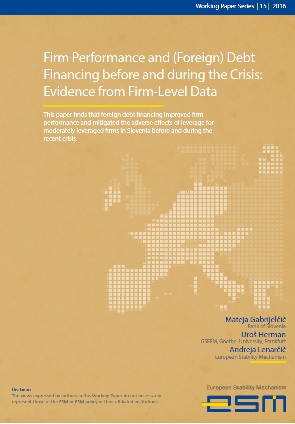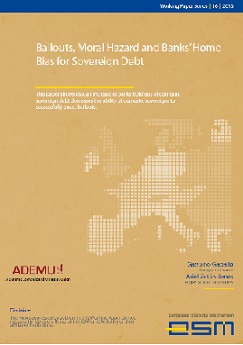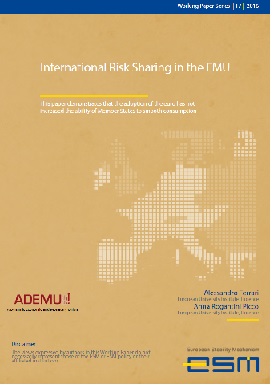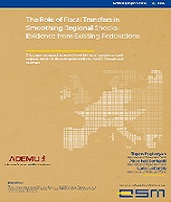Ollivaud, Patrice, Pionnier, Pierre-Alain, Rusticelli, Elena, Schwellnus, Cyrille, Koh, Seung-Hee, (2016), “Forecasting GDP during and after the Great Recession”, OECD Economics Department Working Papers No. 1313, 26 July This paper compares the short-term forecasting performance of state-of-the-art large-scale dynamic factor models (DFMs) and the small-scale bridge models routinely used at the OECD. Pseudoreal time out-of-sample forecasts for France, Germany, Italy, Japan, United Kingdom and the United States during and after the Great Recession …Read More
The Blind Side of Public Debt Spikes
Jaramillo, Laura, Mulas-Granados, Carlos, Kimani, Elijah, (2016), “The Blind Side of Public Debt Spikes”, IMF Working Paper, October What explains public debt spikes since the end of WWII? To answer this question, this paper identifies 179 debt spike episodes from 1945 to 2014 across advanced and developing countries. We find that debt spikes are not rare events and their probability increases with time. We then show that large public debt spikes …Read More
Countering a regressive and illiberal Europe
A. Emmanouilidis, Janis, Zuleeg, Fabian, (2016), “Countering a regressive and illiberal Europe”, European Policy Centre, 13 October After the Brexit vote and the collective failure to predict the impending earthquake and ‘sign of times’, it would be a mistake to carry on as if nothing had happened. Although the UK is undoubtedly a special case, there is a need to reflect more fundamentally on the state of European integration and …Read More
Firm Performance and (Foreign) Debt Financing before and during the Crisis: Evidence from Firm-Level Data
Gabrijelčič, Mateja, Herman, Uroš, Lenarčič, Andreja, (2016), “Firm Performance and (Foreign) Debt Financing before and during the Crisis: Evidence from Firm-Level Data“, ESM Working Paper Series, July We study the effects of financial leverage and foreign financing on firm performance before and during the recent crisis, using a large panel of Slovenian companies. We find a significant negative impact of leverage on firm performance, even when we explicitly control for the reverse causality between …Read More
Bailouts, Moral Hazard and Banks’ Home Bias for Sovereign Debt
Gaballo, Gaetano, Zetlin-Jones, Ariel, (2016), “Bailouts, Moral Hazard and Banks’ Home Bias for Sovereign Debt“, ESM Working Paper Series, July We show that an increase in banks’ holdings of domestic sovereign debt decreases the ability of domestic sovereigns to successfully enact bailouts. When sovereigns finance bailouts with newly issued debt and the price of sovereign debt is sensitive to unanticipated debt issues, then bailouts dilute the value of banks’ sovereign debt holdings rendering bailouts less …Read More
Fiscal decentralisation and income inequality
Stossberg, Sibylle, Bartolini, David, Blöchliger, Hansjörg, (2016), “Fiscal decentralisation and income inequality”, OECD Economics Department Working Papers No. 1331, 11 October This paper investigates the relationship between fiscal decentralisation and economy-wide disposable income inequality. Drawing on a dataset of up to 20 OECD countries over a period from 1996 to 2011, a regression analysis is performed, relating several indicators of national income inequality and a wide array of fiscal decentralisation indicators. …Read More
International Risk Sharing in the EMU
Ferrari, Alessandro, Rogantini Picco, Anna, (2016),“International Risk Sharing in the EMU” , ESM Working Paper Series, July 2016 This paper aims at empirically assessing the effect of the adoption of the euro on the ability of euro area member states to smooth consumption and share risk. With the objective of evaluating the economic performance of euro area countries in the scenario where the euro had not been adopted, we construct a counterfactual dataset of macroeconomic variables …Read More
The Role of Fiscal Transfers in Smoothing Regional Shocks: Evidence from Existing Federations
Poghosyan, Tigran, Senhadji, Abdelhak, Cottarelli, Carlo, (2016), ” The Role of Fiscal Transfers in Smoothing Regional Shocks: Evidence from Existing Federations“, ESM Working Paper Series, July 2016 We assess the extent to which fiscal transfers smooth regional shocks in three large federations: the US, Canada and Australia. We find that fiscal transfers offset 4-11 percent of idiosyncratic shocks (risk-sharing) and 13-24 percent of permanent shocks (redistribution). This fiscal insurance largely operates through automatic stabilizers embedded …Read More
The flexibility of new hires’ earnings during a recession
Lydon, Reamonn, Lozej, Matija, (2016), “The flexibility of new hires’ earnings during a recession”, VoxEu, 2 October The evolution of earnings over the business cycle has important implications for consumption and welfare. This column shows that the earnings of new hires in Ireland – and in particular, new hires with less valuable outside options – are substantially more flexible than those of incumbents during a recession. The results indicate that …Read More
Who Borrows from the Lender of Last Resort?
Drechsler, Itamar, Drechsel, Thomas, Marques-Ibanez, David, Schnabl, Philipp, (2016), “Who Borrows from the Lender of Last Resort?”, The Journal of Finance, 14 September We analyze lender of last resort (LOLR) lending during the European sovereign debt crisis. Using a novel data set on all central bank lending and collateral, we show that weakly capitalized banks took out more LOLR loans and used riskier collateral than strongly capitalized banks. We also find …Read More








